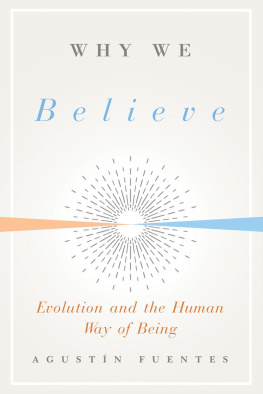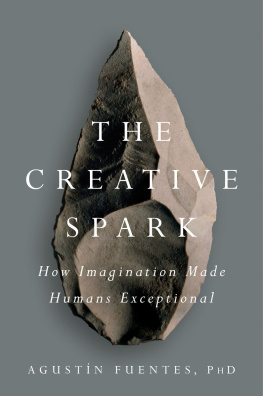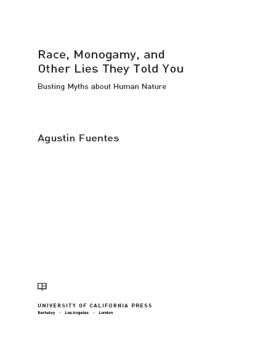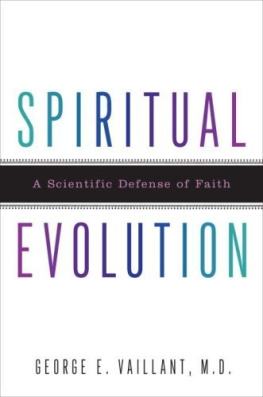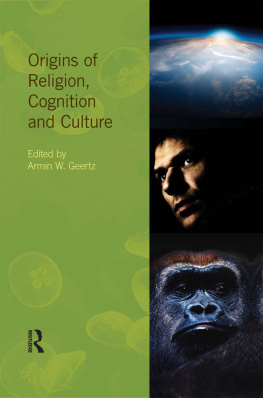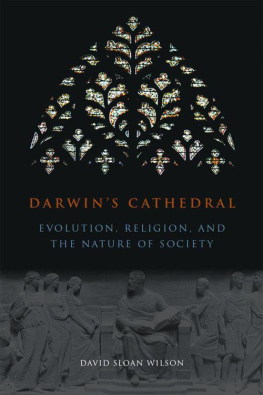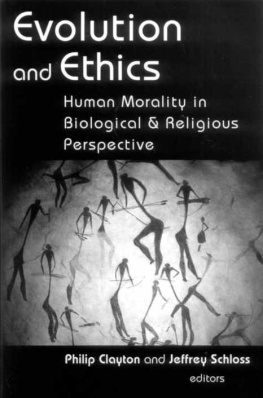
FOUNDATIONAL QUESTIONS IN SCIENCE
At its deepest level, science becomes nearly indistinguishable from philosophy. The most fundamental scientific questions address the ultimate nature of the world. Foundational Questions in Science, jointly published by Templeton Press and Yale University Press, invites prominent scientists to ask these questions, describe our current best approaches to the answers, and tell us where such answers may lead: the new realities they point to and the further questions they compel us to ask. Intended for interested lay readers, students, and young scientists, these short volumes show how science approaches the mysteries of the world around us and offer readers a chance to explore the implications at the profoundest and most exciting levels.
Why We Believe
Evolution and the Human Way of Being

Agustn Fuentes

Copyright 2019 by Agustn Fuentes
All rights reserved.
This book may not be reproduced, in whole or in part, including illustrations, in any form (beyond that copying permitted by Sections 107 and 108 of the U.S. Copyright Law and except by reviewers for the public press), without written permission from the publishers.
Yale University Press books may be purchased in quantity for educational, business, or promotional use. For information, please e-mail sales.press@yale.edu (U.S. office) or sales@yaleup.co.uk (U.K. office).
Designed and set in Hoefler Text by Gopa & Ted2, Inc.
Printed in the United States of America.
Library of Congress Control Number: 2019937669
ISBN 978-0-300-24399-4 (hardcover : alk. paper)
ISBN 978-0-300-24925-5 (eBook)
A catalogue record for this book is available from the British Library.
This paper meets the requirements of ANSI/NISO Z39.48-1992
(Permanence of Paper).
10 9 8 7 6 5 4 3 2 1
To Humanity,
we who are neither accident nor miracle
Contents
Preface
B ELIEF is the most prominent, promising, and dangerous capacity that humanity has evolved.
Belief is the ability to draw on our range of cognitive and social resources, our histories and experiences, and combine them with our imagination. It is the power to think beyond what is here and now and develop mental representations in order to see and feel and know something an idea, a vision, a necessity, a possibility, a truththat is not immediately present to the senses, and then to invest, wholly and authentically, in that something so that it becomes ones reality.
Beliefs and belief systems permeate human neurobiologies, bodies, and ecologies, acting as dynamic agents in evolutionary processes. The human capacity for belief, the specifics of belief, and our diverse belief systems structure and shape our daily lives, our societies, and the world around us. We are human, therefore we believe.
SHERRINGTONS CHALLENGE
Eighty years ago, when giving his famous Gifford Lectures in Edinburgh, the Nobel Prizewinning neurophysiologist that the development of the human, in body and mind, was neither accident nor miracle, that organisms must be the sum of their parts and more, and that the mind makes an effective contribution to life. What continued to elude the science of his time, he went on, was an explanation for how all of that could be true. While a complete and final answer to the human still eludes us (and maybe always will), we are far better able than Sherrington was in 1937 to offer insights about how humans evolved and how we develop in body and in mind.
In this book I take up Sherringtons challenge and update his questions:
How do we understand humanity as neither the result of random processes nor the product of divine intervention?
How can we be made up entirely of biological parts and organic processes and still dream, hope, and believe?
How can our minds and our beliefs shape ourselves, other life around us, and even the planet itself?
If we can answer these questions, not just of human development, but of human becoming, of human believing, then we can step closer to the goals Sherrington sought.
Today we have a much better scientific understanding of the processes of human development and evolution than Sherrington did. Developmental biology, genomics, and evolutionary science have made enormous leaps in the past century and especially in the past few decades. The same is true for the study of the human past. Paleoanthropology, archaeology, anthropology, and neurobiology have given us a radically new landscape of understanding, of knowing, and of forecasting about ourselves, other life, and the whole planet.
In the first two decades of the twenty-first century weve redefined the very foundations of our evolutionary history, how our biology functions, and what it means to ask how we become who we are. Humans are neither accident nor miracle, and the explanation of who and why we are is an amazingly complex, dynamic, enticing, and unfinished story. It is a story in which belief is central, as both an outcome and a cause.
My own background is as an anthropologist, meaning I am trained in the biological and behavioral study of humans and our closest relatives. I have spent the past thirty years in deep engagement with the bodies, actions, and ecologies of humans past and present, of primates across the globe, and as an active participant in the debates about, and modeling of, evolutionary processes. I have long been enmeshed in enriching, enlightening, and maddening collaborations with a diverse array of scientists, philosophers, theologians, and other scholars. It is this type of transdisciplinary engagement, the cross-fertilization of ideas, methods, and theoretical grounds that I bring to bear on the data from human bodies and behavior past and present.
As an evolutionary scientist I try to uncover the specific origins, functions, and processes that undergird our capacity for belief. As a social scientist I seek to understand these findings in the context of the human experience: our social structures, belief systems, and daily lives. My goal in pursuing both of these pathways is to develop a better understanding of what it means to be humanpast, present, and future.
In this book I share with you a story of our evolution rooted in the scientific endeavor, in the facts of our bodies, genes, ecologies, histories, and behaviors, but one that tries not to lose sight of the equally relevant philosophical narratives that run alongside and through the science. Unlike most evolutionary narratives, the one I present ties the explanation of humanity to our distinctive capacity for belief.
A LITTLE CLARIFICATION OF TERMINOLOGY AND CONTENT
In this book I use the term belief to mean more than its basic definition of trust, faith, or confidence in someone or something. It is not about being fooled.
The literary theorist Terry Eagleton, drawing on the philosopher Kierkegaard, tells us that the act of Believing is an act of being wholly and completely in love with a concept, an experience, a knowledge. But believing is also an avenue to imagining and becoming, in ways that need not be rooted in the daily material reality but that can be infused with hope. Believing can be fearing an unknown but wholly felt entity or perception, or it can be a certainty of something that cannot be seen, grasped, or measured. Believing is completely real but often without material substance. And most critically, undergirding and infusing belief is the human capacity to imagine, to be creative, to hope and dream, and to infuse the world with meaning.
Next page
